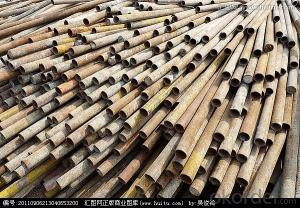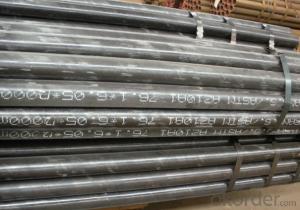High-quality Carbon Seamless Steel Pipe For Boiler STPG42 CNBM
- Loading Port:
- Qingdao
- Payment Terms:
- TT OR LC
- Min Order Qty:
- 10 pc
- Supply Capability:
- 30 pc/month
OKorder Service Pledge
OKorder Financial Service
You Might Also Like
Quick Details
| Thickness: | 3 - 60 mm | Section Shape: | Round | Outer Diameter: | 21.3 - 1220 mm |
| Secondary Or Not: | Non-secondary | Application: | fluid pipe,boiler pipe, structural pipe, oil/gas/water pipe etc | ||
| Technique: | Hot Rolled | Certification: | ISO9001-2000, ISO14000, ISO18000 , API 5L | Surface Treatment: | Painted, Oiled, galvanized or phosphate etc |
| Special Pipe: | API Pipe | Alloy Or Not: | Is Alloy | Technique:: | Hot rolled or cold rolled |
| Special pipe:: | API/ ASME/thickwall/oil/gas/water pipe | Length:: | 3-12m | Treatment of two ends:: | Beveled end , plain end etc |
| Brand:: | Bai Chuan | Third Party Inspection:: | BV, SGS etc. | Schedule:: | SCH10-SCH160, XS, XXS |
| Other Material:: | 10#, 20#, 16Mn, Q345 etc | Material Type:: | Carbon steel/ Low alloy steel | Producing standard:: | American/Japanese/ German/ Britain/ Chinese standard |
| Grade: | A53(A,B),A106(B,C),A210,API J55,St37,STPG42,A53-A369,API J55-API P110,ST35-ST52 | Standard: | BS EN10296,JIS G3452-2004 |
1. Out Diameter: | 21.3mm-1220mm |
2. Wall Thickness: | 3mm-60mm |
3. Length: | 3m-12m |
4. Producing Standard: |
|
5. Main Material: (Carbon Steel & Low Alloy steel) |
|
6. Special specifications: | Available according to customer’s requirements and quantity. |
7. End Shape: | Beveled end , plain end, varnished, or adding plastic caps to protect the two ends as per customer’s requirements. |
8. Surface treatment: | Painted, Oiled, galvanized, phosphate etc. |
9. Usage: |
|
10. Certificates: | ISO9001-2000, ISO14000, ISO18000, API 5L certificate |
11. Third party inspection: | Welcome you to send a third party inspecting company (BV, SGS etc) to check the quality of our final products. |
12. Pictures: | our producing flow chart, our factory, production line, inspecting equipments, our products are listed below for your reference. |
- Q:How are steel pipes used in the construction of water supply systems?
- Steel pipes are commonly used in the construction of water supply systems due to their durability, strength, and resistance to corrosion. These pipes are used to transport water from the source to various points of distribution, such as buildings, homes, and industries. Steel pipes are often buried underground or installed above ground, depending on the specific requirements of the project. Additionally, steel pipes can withstand high pressure and are suitable for carrying large volumes of water, making them a reliable choice for water supply systems.
- Q:Can steel pipes be used for hydronic heating systems?
- Yes, steel pipes can be used for hydronic heating systems. Steel pipes are commonly used in hydronic heating systems due to their durability, strength, and ability to withstand high temperatures and pressures. They are also resistant to corrosion, making them suitable for long-term use in these systems.
- Q:How are steel pipes used in water treatment plants?
- Steel pipes are commonly used in water treatment plants to transport and distribute water throughout the facility. They are used for various purposes, such as conveying raw water from the source to the treatment plant, distributing treated water to different areas, and carrying wastewater to the appropriate treatment processes. The durability and strength of steel pipes make them suitable for handling the high pressure and corrosive nature of water in these industrial settings.
- Q:How do steel pipes resist corrosion?
- Steel pipes resist corrosion through a process called passivation, wherein a protective layer of oxide forms on the surface of the steel, preventing further oxidation and corrosion. Additionally, the pipes can be coated with anti-corrosive materials or undergo treatments such as galvanization or lining to enhance their resistance against corrosion.
- Q:What are the applications of stainless steel pipes?
- Stainless steel pipes have a wide range of applications in various industries. They are commonly used in plumbing systems, oil and gas transportation, chemical processing, food and beverage production, and pharmaceutical applications. These pipes offer excellent resistance to corrosion, high strength, and durability, making them suitable for environments that require hygienic conditions, high pressure, or extreme temperatures. Additionally, they are often used for structural purposes, such as in construction and architectural projects.
- Q:How are steel pipes used in the power generation industry?
- Steel pipes are widely used in the power generation industry for various purposes such as transporting fluids, gases, and steam, as well as for structural support and heat exchange. They are used in power plants for conveying cooling water, fuel, and exhaust gases, as well as in boiler systems for transporting high-pressure steam. Additionally, steel pipes are utilized for constructing heat exchangers, condensers, and other critical components, ensuring the efficient and reliable operation of power generation facilities.
- Q:Is there any difference between thermal expansion seamless steel pipe and seamless steel pipe?
- Seamless tubes are generally produced on continuous tube mills, also known as automatic rolling mills. The round steel is cut into the required length, centering on the end face of the pipe blank and then sent to the heating furnace to punch on the piercer. At the same time, the hole rotates and advances continuously. Under the action of the roller and the plug, the inner cavity of the pipe blank is gradually formed, and the cavity is called the capillary. Sent to the automatic tube rolling mill on rolling. Finally, the thickness of the whole machine is the same, and the diameter of the sizing machine is determined to meet the specifications.
- Q:What is hot rolled steel pipe? What is a cold drawn steel tube?
- Hot rolling is relative to cold rolling, cold rolling is performed under recrystallization temperature, while hot rolling is rolling above recrystallization temperature.
- Q:How do you measure the thickness of a steel pipe?
- There are several ways to measure the thickness of a steel pipe. One common method is to use a specialized tool called a caliper or micrometer. This tool allows you to precisely measure the diameter of the pipe at various points, and by subtracting the inner diameter from the outer diameter, you can determine the thickness. Another approach is to use an ultrasonic thickness gauge, which uses sound waves to measure the thickness of the pipe. This non-destructive testing method is particularly useful for pipes that are already installed or are difficult to access. Additionally, you can also use a magnetic or eddy current thickness gauge, which relies on the principle of magnetism or electromagnetic induction to measure the thickness of the pipe.
- Q:Can steel pipes be used for drainage systems?
- Yes, steel pipes can be used for drainage systems. Steel pipes are durable, resistant to corrosion, and have high strength, making them suitable for carrying and managing the flow of water in drainage systems.
1. Manufacturer Overview |
|
|---|---|
| Location | |
| Year Established | |
| Annual Output Value | |
| Main Markets | |
| Company Certifications | |
2. Manufacturer Certificates |
|
|---|---|
| a) Certification Name | |
| Range | |
| Reference | |
| Validity Period | |
3. Manufacturer Capability |
|
|---|---|
| a)Trade Capacity | |
| Nearest Port | |
| Export Percentage | |
| No.of Employees in Trade Department | |
| Language Spoken: | |
| b)Factory Information | |
| Factory Size: | |
| No. of Production Lines | |
| Contract Manufacturing | |
| Product Price Range | |
Send your message to us
High-quality Carbon Seamless Steel Pipe For Boiler STPG42 CNBM
- Loading Port:
- Qingdao
- Payment Terms:
- TT OR LC
- Min Order Qty:
- 10 pc
- Supply Capability:
- 30 pc/month
OKorder Service Pledge
OKorder Financial Service
Similar products
New products
Hot products
Related keywords































